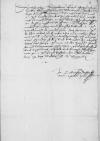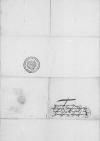 GStA, PK, HBA, C 2, No 80, f. 1r
GStA, PK, HBA, C 2, No 80, f. 1r
Durchlauchter, hochgeborner(r) furst, / hochgunstig(e)r, lieber her(r) und freundt. / Meine fruntliche, willige dienst zuvoran(n). /
Wie wol ich dis mol E(wer) Ir(barkei)t nichts sunders zu schreiben(n) hab, / mocht ich dennoch dissen E(wer) Ir(barkei)t moler, Crispin Herranth (†1549), pupil of Albrecht Dürer; painter at Albrecht von Hohenzollern-Ansbachs court⌊meister CrispinCrispin Herranth (†1549), pupil of Albrecht Dürer; painter at Albrecht von Hohenzollern-Ansbachs court⌋, an dissen meynen(n) briff von mir nicht superinscribed⌈nichtnicht superinscribed⌉ lossen(n), do neben(n) fruntlich und fleissig bittend, / E(wer) Ir(barkei)t wold nicht do wider sein, / das her(r) aus E(wer) Ir(barkei)t bilden etlich stuk mir thet aus molen(n), / das ich um(m)b E(wer) Ir(barkei)t fruntlich zuvordinen(n) alweg wil schuldig sein(n), / und bitt Got den almechtigen[1], das her E(wer) Ir(barkei)t mit al den iren(n) in fried, / gnad, / langweriger gesuntheit, / glukseligen stand und regirung / erhalde und beware, / mich hiemit in E(wer) Ir(barkei)t gunst befhelend etc.
 GStA, PK, HBA, C 2, No 80, f. 1v
GStA, PK, HBA, C 2, No 80, f. 1v  GStA, PK, HBA, C 2, No 80, f. 1r
GStA, PK, HBA, C 2, No 80, f. 1r 
